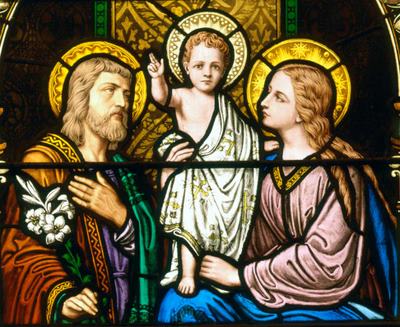Holy Family Sunday (Year "A") - December 26, 2010 CHRISTIAN FAMILY LIFE: ADAPTABLE AND HOLY [Texts: Sirach 3:2-6, 12-14 [Psalm 128]; Colossians 3:12-21; Matthew 2:13-15, 19-23]
The Holy Family (Raphael, 1483-1520)
The reading from Sirach expresses a type of Israelite wisdom that found expression in maxims. These describe the duties of children towards their parents: respect, honour, obedience, understanding, and help in old age. The blessings promised those who reverence their parents include long life, forgiveness of sins and being firmly rooted as persons.
Ben Sira seems to have been the first biblical author to develop a commentary on the commandment “Honour your father and your mother”. Prior treatment of familial duties in the Book of Proverbs had been scattered and couched mainly in negative terms. In his positive treatment the sage had in mind primarily adolescents living at home. But it is clear that the teaching extends to adults with elderly parents (“help your parents in their old age ... even if their minds fail, be patient with them”).
In Colossians, Paul typifies Christian life in its outward expression: compassion, kindness, humility, meekness, patience, support, pardon, peace, openness to God's Word and prayer. The Apostle then goes on to show how these are lived out in the mutuality of Christian family life.
The latter part of the epistle (“Wives, be subject to your husbands ... Fathers, do not provoke your children or they may lose heart”) forms the introduction to a type of teaching on life in a household known as the Haustafel (German for “household code”).
Such sets of instructions for the various members of a household—husbands and wives, parents and children, masters and slaves—are found elsewhere in the New Testament (cf. Ephesians 5:21-6:9; 1 Peter 2:18-3:7; Titus 2:1-10; 1 Timothy 2:8-15; 6:1-2).
These Christian “codes” have been praised as creative adaptations by the Church of noble sentiments from the surrounding culture. Others have castigated them as the introduction of bourgeois values into Christian life.
Recent research suggests that the household code, while it has affinities with similar instructions from the Hellenistic world, is a Christian creation based on patterns inherited from Judaism. The New Testament writers seem to have emphasized, in the first instance, the subordinate members (wives—children—slaves) because they were in a difficult social situation. In the circumstances that prevailed in Colossae, they were particularly prone to economic and other forms of suffering.
Though historically these texts have been misused, this has occurred because men—the husbands, fathers and slave owners—have failed to heed the overarching disposition that should characterize their relations with others.
The principle governing all behaviour serves as an introduction to the listing of each person's duties: “Whatever you do, in word or deed, do everything in the name of the Lord Jesus, giving thanks to God the Father through Him”.
The injunction addressed to wives to “be subject/be subordinate” causes difficulty today until one realizes that the goal of this attitude of humility is not ultimately the woman's husband but God (“as is fitting in the Lord”). For their part, husbands are to “love your wives and never treat them harshly”.
For, in the end, all members of the household are subject to Christ and God. This may be why, in the epistle to the Ephesians, husbands and wives are placed under the same rule, “subordinate yourselves to one another!” (Ephesians 5:21)
However, when he returned to Judea, Joseph was left to draw his own conclusion that living under Archelaus would not afford Mary and Jesus the security they needed. Accordingly, Joseph moved his household to Nazareth in Galilee. Though the Scriptures afford believers maxims, household codes and other guidelines, living one's life in holiness demands personal reflection and decision-making in light of them.
* * * * * *
O God, who were pleased to give us the shining example of the Holy Family, graciously grant that we may imitate them in practicing the virtues of family life and in the bonds of charity, and so, in the joy of your house, delight one day in eternal rewards. Through our Lord.


beautiful description
ReplyDelete